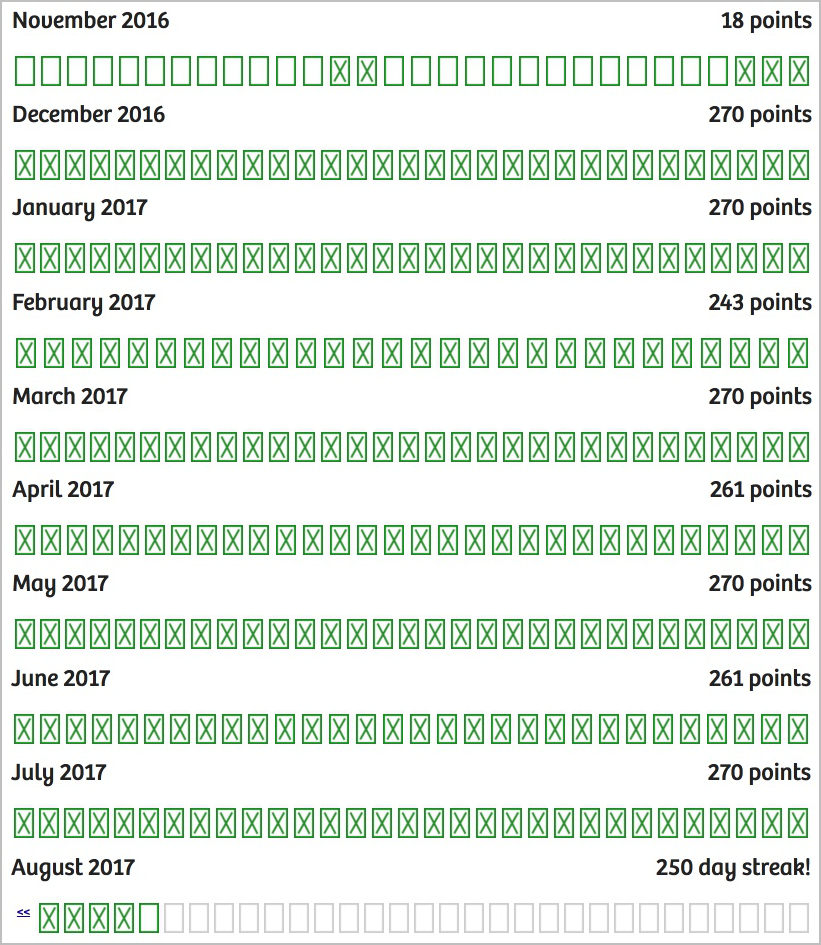Project Description
250 days later
Published: August 07, 2017
This past weekend I hit day 250 of my daily writing habit. A habit I started last November and talked about in decent detail back in January:
“Basically, I sit down in front of my computer every morning, and I just dump my brain for 20 minutes…
“…With free writing, I never feel stuck. I never feel pressure to overcome a block. When one train of thought fizzles out, I just pick up another. And there’s always another. And there’s always another one after that. I’ll circle back if that’s where my mind wanders, but otherwise I just follow my mind wherever it jumps. I like the simplicity of it.”
Honestly, I can’t remember the last time I committed to anything for 250 days in a row, so I’m riding a bit of a high right now.
From the beginning, my goal has been to write at least 750 words each day, which means in the last 250 days I’ve written 187,500 words minimum. So that’s a crazy number.
That’s like 3 novels worth of text. 20 minutes of writing per day and 8 months later I’ve got enough words to fill a trilogy of paperbacks.
Small progress adds up big over time.
Of course I don’t actually have any novels to show for my writing efforts. That’s not really the point of free writing. Free writing is meant to be spontaneous, loose, fast, and rough. At least that’s how mine looks.
Free writing is my chance to dump my brain and organize my thoughts. It’s a form of therapy honestly. There’s a surprising amount of space inside of 750 words to dream, explore, and discover.
So, how did I turn this activity I value into such a strong and consistent habit?
Don’t break the chain
There’s a popular productivity technique out there called “don’t break the chain.” I’ve seen it most often attributed to Jerry Seinfeld (yup, that one, the famous comedian), but who knows where it actually originated.
The idea behind the technique is simple:
- Pick an activity you want to make a habit.
- Hang up a calendar that displays all 365 days of the year.
- Every day you complete your habit, mark a big “X” over that day on your calendar.
- Don’t miss a day. Watch the X’s line up and form a chain. Don’t break your chain.
Basically, to get good at something, consistency is more important than everything else. It’s better to practice something a little bit every day than to practice a lot once or twice a month.

I use an app called 750 Words to track my free writing
Consistency means building habits, and that’s most often how the “don’t break the chain” method is talked about. Show up every day. Use your chain as a reminder. Build a habit so that practice becomes automatic. Always be improving, even if it’s just 1% per day.
Small progress adds up big over time.
This is the technique I used to build my free writing habit, and it totally worked for me, but 250 days in, I’ve noticed an unfortunate side effect of trying to maintain such a long, unbroken streak.
Mounting pressure
250 days is a lot of days. That’s 8 months of work. 8 months of every day making a conscious decision to try and improve my writing by sitting down and actually writing something.
Buried in those 250 days were many days I didn’t feel like writing anything at all. It took effort to make the words come out. It took effort to make time to write.
If I mess up tomorrow and I miss a day, *poof*. Streak gone. Chain broken. 250 days of work reset back to 0. It would take me every day until March 2018 to work my way back up to 250.
That’s a lot of pressure. Having the weight of a big streak constantly bearing down on me makes the writing process stressful sometimes. Streaks like this raise the stakes in a totally artificial but still psychologically significant way.
It’s a fine line between motivating and stress-inducing.
I also worry that the devastation that comes with breaking such a big streak will make it harder to get back on the horse when I inevitably fall off of it. No streak lasts forever.
Of course, when I do ultimately break my streak, I won’t really be starting from scratch. My chain will reset, sure, but it’s not like the habit I’ve spent the last 250 days growing will suddenly disappear. I won’t forget the discipline I’ve developed or the joys I’ve found in free writing.
And really, this has always been about building a habit, not about watching my daily streak count rise.
On the bright side, dealing with the psychological pressure of keeping my streak alive has taught me an important lesson about priorities. A lesson I’ve known for a while but hoped wasn’t true.
There will always be enough time
The power of habits is that they eventually become automatic. Most days I don’t even have to think about getting my words done. It just kind of happens.
Writing is ingrained in my mornings now, and oftentimes my subconscious mind will navigate to the site where I do all my free writing without my conscious mind even getting involved. No friction. It’s nice.
Occasionally though, things happen that break my routines and prevent me from completing my free writing in my usual way.
When this happens, free writing goes on a backburner until I can squeeze it in. Usually it only sits on the backburner for a few minutes. Maybe a few hours. Some days though, life gets busy (or I space and forget) until way late at night.
To keep my streak alive, I need to finish 750 words of free writing before midnight each day, so days that get late without me finishing my words get stressful.
But you know what? I always get my words done. No matter how late it gets, no matter how many other commitments I make in a day, I always manage to set aside 15 minutes to write my words and keep my streak going.
Had I been asked to complete any other hobby given similar circumstances, a hobby that didn’t have the psychological pressure of a big streak attached, I know I would have convinced myself that it was too late or I was too busy to work on it.
I’m really good at convincing myself that “there’s not enough time” when really I just don’t want to suffer the discomfort of hard work. It’s a skill we all possess I think.
I stated all of this more succinctly in my last post:
“You’re going to complain about time a lot, but there will always be enough time. We’re all given the same 168 hours each week to work with, so when time feels scarce, it’s usually your priorities at fault.”
We all complain about time. We all make excuses for not being able to find enough time in the day to complete the things we claim are important to us. But time can’t be found. It has to be made.
We make time for the things that are important to us. Period. With few exceptions, how we spend our time determines our priorities.
If it’s important to you, then do it. Make the time. If you don’t, then whatever the activity is, it’s probably not as important to you as you think it is.
So when I’m sinking into my couch after work watching Netflix for the third night in a row, I have to accept the fact that Netflix is my priority. Not becoming a better programmer or being a better boyfriend or working to improve my health. Netflix. Consciously or unconsciously, I’ve made a decision that put Netflix at the top of my list of important things.
And there’s nothing wrong with prioritizing something like Netflix, but it’s a vicious trap when we convince ourselves that traveling the world is our number one top priority in life when our time allocation has never reflected that goal.
Talking about your priorities isn’t enough. You have to vote with your time.
Building something bigger
I really value writing. I’ve said it a couple different ways in the last two years. Most recently:
“…Writing is like digging for gold. Gold is awesome! We all want gold. But we’re never going to find gold if all we do is sit at the water’s edge and wait for it to surface. We have to go digging for it. We have to get our hands dirty. We have to scoop debris into a pan and shake the silt out. Then we have to do it again. Then again. 100 times. 200 times. 1000 times. If we keep at it long enough, one of those times we’re going to shake the silt away and see a glimmer.
“The same is true of writing. We all have good ideas buried in our heads, but we shouldn’t expect our best ideas to surface on their own. We’ve got to go digging for them. Writing is how we shake the silt out. We won’t strike gold every day, but we’ll never strike gold if we don’t dig.”
Oh baby! Have I been digging!
And my results?
Well, every blog post I’ve published this year (including this one) started its life inside one of my free writing sessions:
- New advice to new grads (659 words)
- They let me speak at my college graduation (1,950 words)
- SpaceX is doing a thing! (1,128 words)
- My favorite films of 2016 (5,163 words)
- Two years at Blue Sky (1,785 words)
- I wrote 35,280 words in December (2,455 words)
That’s 13,140 words I’m proud to have put out into the world. Not a bad start.
Additionally, I’m using free writing as a tool to help me overcome my fear of creative writing. It’s early goings, so I’m still terrified of it, but there’s no faster way to grow your confidence than to fail quickly 100 times in a safe environment, right?
I’ve also got a goal to generate 1,000 app ideas (more on this in a future post), and free writing is my space to explore every crazy idea that pops into my head.
Most importantly though, these last 250 days of writing feel like building blocks. Like I’m laying the groundwork for something bigger in the future.
At this point, I feel like I’m going to continue writing these words for a long time. Every day, 20 minutes of time and space devoted to exploring whatever’s on my mind. 20 minutes of daily reflection. A gift to my future self. Wrapped carefully these last 250 days to be delivered tomorrow, the next day, and every morning from now on.
It feels really good to know that if I try, I can commit to something for 250 straight days. It’s a good confidence booster. It makes me feel like I can commit to anything now.
All I have to do is choose what comes next.
Cheers.
***
Image credit: Chuttersnap





Yay, Danny! You are very inspirational. I have a love for writing as well, and I am going to try this 250 days straight of 750 words a day thing. Thank you! Have you ever heard of One Second Every Day? It’s a thing where you take one second of video every day for 365 days, then you combine it all and you have a years worth of small memories. I started that today.
All the Best
Absolutely awesome Danny. What a great feeling, right? I have written 1000 to 10,000 words daily for many, many years. Things going A-OK with my blog and brand :) I learned of this chain method after hearing how Seinfeld stuck to it for many years. He practiced like mad, persisted in honing his skills and over time, he became the most well-known comic of modern times. I only gain confidence and clarity as I continue to write, create and connect with other human beings.